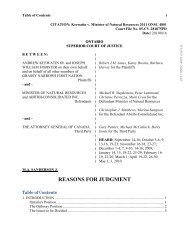Omers Energy Inc. v. Alberta (Energy Resources Conservation Board)
Omers Energy Inc. v. Alberta (Energy Resources Conservation Board)
Omers Energy Inc. v. Alberta (Energy Resources Conservation Board)
- No tags were found...
Create successful ePaper yourself
Turn your PDF publications into a flip-book with our unique Google optimized e-Paper software.
Page: 222. If the lessee is conducting operations related to repair or maintenance at the end ofthe primary term, the lease will not expire;3. If a well is capable of producing but is shut-in (for instance, market conditions),the lease will not expire; and4. If the shut-in well is not capable of producing but the lessee is conductingoperations on the well, the lease will not expire.[94] In my view, the parties intended that to continue the lease past the primary term, the wellmust be capable of producing a volumetric quantity that would encourage both production andoperations to maximize that production. The lessee is granted a substantial primary term where ithas great discretion as to timing of its operations. But if it seeks to hold the lease past the primaryterm, there are conditions. The various lease provisions were intended to balance the parties’ rightsby ensuring that the interests of the lessee are protected, while at the same time ensuring that theterm of the lease cannot be extended indefinitely when there is no reasonable expectation of a returnto profitability in the near future.[95] Given the rationale which the <strong>Board</strong> employed to support its choice of “meaningful”, I donot see a significant difference between “meaningful” quantity and “paying” quantity – although incertain circumstances the latter may provide more latitude than the former. While I am not preparedto interpret the Suspended Wells Clause as requiring production in “paying quantities”, I note thatthe reasoning behind the concept of “paying quantities” in the American authorities, and that usedby the <strong>Board</strong> for choosing “material” and “meaningful”, are very similar. That rationale seeks tosupport the common objective of the parties to benefit by profit from development of the resource.It strains common sense to think a lessor would agree to tie up its land past the primary term, andperhaps indefinitely, for a lessee’s speculative purposes only and for a well that lacks commercialviability: see Freyberg at para 50. By using the term “meaningful” the direction of the <strong>Board</strong>appears to be much the same as that of the American courts in choosing “paying quantities”. Beforea lessee can take advantage of the Habendum Clause and the Suspended Wells Clause to extend ormaintain the lease beyond the primary term, there must be a meaningful amount of resource capableof production. It was never intended that the shut-in well clause could allow a lessee to hold aproperty for purely speculative purposes. There must be some commercial viability to the well.Moreover, if the well requires operations of the type defined in the lease to be capable of producingthat meaningful quantity, those operations, must be conducted as required by the lease.[96] In cases where the production is clearly profitable, quantification, and how it is arrived at,will not be an issue. Certainly in this case, the volume was not meaningful by any application of thatword, as indicated by the short time gas flowed after the two clean outs. As cases move forwardthrough the <strong>Board</strong> and the courts, the volumetric test will undoubtedly be refined within the contextof the specific cases. The tests set out in Clifton relating to marginal wells may prove helpful guidesin developing Canadian jurisprudence on this issue. As noted in paragraphs 63-64, some questionsa tribunal might ask are: Would a reasonably prudent operator, for the purpose of making a profit
















